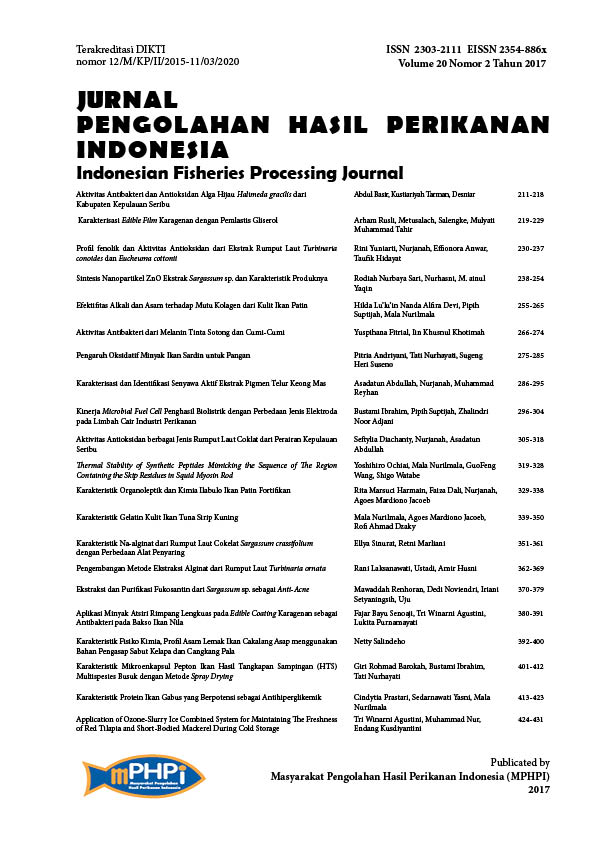Abstract
Sardine is an economic fish industry product in Indonesia. Sardin fish oil of fish meal by-product can be processed into ethyl ester as a food grade product. The purpose of this study were to determine the chemical and physical the best ethyl ester of Semirefined and refined oil from sardine fish meal by-products. Results showed that heavy metals detected was cadmium (Cd) value, i.e. 0.02 ppm. SFA content of crude oil sardines was 29.39% with palmitic acid (16.24%) as the predominant fatty acids. The MUFA content amounted to 14.87% with palmitic acid as the predominant fatty acid (5.76%). The PUFA content were 35.47% with DHA (17.07%) as the predominant fatty acid, while EPA amounted to 13.82%. Semirefined oil transformed into Semirefined ethyl ester oil was the best on oxidative and physical parameters. Oxidation process produced Semirefined ethyl ester with 1.50±0.00 mEq/kg peroxide value (PV), 0.90±0.15% fatty
acids (% FFA), 5.46±0.32 mEq/kg Anisidin p-value (p-AV), 8.46±0.32 mEq/kg oxidation (TOTOKS), 62.15±0.27%T viscosity and and 5.65±0,26 cP clarity.
acids (% FFA), 5.46±0.32 mEq/kg Anisidin p-value (p-AV), 8.46±0.32 mEq/kg oxidation (TOTOKS), 62.15±0.27%T viscosity and and 5.65±0,26 cP clarity.
Authors
AndriyaniP., NurhayatiT., & SusenoS. H. (2017). Effect of Oxidative Sardin Fish Oil for Food Utilization. Jurnal Pengolahan Hasil Perikanan Indonesia, 20(2), 275-285. https://doi.org/10.17844/jphpi.v20i2.17908
Authors who publish with this journal agree to the following terms:
- Authors retain copyright and grant the journal right of first publication with the work simultaneously licensed under a Creative Commons Attribution License that allows others to share the work with an acknowledgement of the work's authorship and initial publication in this journal.
- Authors are able to enter into separate, additional contractual arrangements for the non-exclusive distribution of the journal's published version of the work (e.g., post it to an institutional repository or publish it in a book), with an acknowledgement of its initial publication in this journal.





